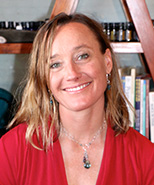What is ayurveda?
Ayurvedic medicine is a system of healing that originated in ancient India approximately 5000 years ago. The Sanskrit word Ayurveda means the Science of life. This system of holistic medicine is drawn from the Vedas, which are ancient religious and philosophical texts of India that are the oldest surviving literature in the world, making Ayurvedic medicine the oldest surviving healing system. According to the texts, Ayurveda was conceived by enlightened wise men (Rishis) as a system of living harmoniously and maintaining the body so that mental and spiritual awareness could be possible. They also reveal that all disease begins with an imbalance in the individual’s consciousness, that then moves into the body/mind matrix. This philosophy believes all objects in the universe, including the human body are composed of five basic elements, Panchamahabhutas, which are earth, water, fire, air, and ether. There is a balanced concentration of these elements in different proportions to suit the needs and requirements of individuals.
The goal of Ayurveda is prevention as well as promotion of the body's own capacity for maintenance and balance. This is approached through the body, mind and spirit of each individual, using the tools of a healthy diet and lifestyle, exercise, herbal supplements, yoga, meditation, massage, aromatherapy, and panchakarma (cleansing) therapies. Ayurvedic treatment is non-invasive and non-toxic, so it can be used safely as an alternative therapy or complimentary to conventional therapies.
It has been called the sister science to yoga. Generally speaking, Ayurveda deals more with the health of the body, while yoga deals with purifying the mind and consciousness, but in reality they complement and embrace each other.
Return to topDoshas (Body Types)
In Ayurveda, identifying a person’s body types, also called doshas, are the way a practitioner helps determine how to help a client achieve optimum health and peace of mind. This is done using many traditional techniques to see where a person is currently both in and out balance. Perhaps the most obvious way to get a basic idea of your dominant body type, is to look at these general characteristics below. (You may also take the quiz.) We each have every dosha in us, only in differing amounts. So don’t be surprised if you find an aspect of yourself under each set of dosha characteristics. There can be one, two, and more rarely, three dominant body types. To get a more comprehensive evaluation, please schedule an appointment.
Vata
- Controls: All motion – breathing, circulation, elimination, and the flow of nerve impulses to and from the brain
- Elements: Air and space (ether)
- Qualities: Dry, light, quick, cold, subtle, thin, rough
- Personality: Fast speaking and fast moving, creative & energetic
- Physical challenges: Often constipation, gas, dry skin
- Emotional challenges: Anxiety, fear, worry, overwhelm
- Body characteristics: Often thin with narrow frame, long neck and bones
Pitta
- Controls: Digestion and metabolism – the processing of food, air and water throughout the body
- Elements: Fire and water
- Qualities: Hot, oily, sharp, acidic, fluid, and intense by nature
- Personality: Focused, energetic, intense, visionary
- Physical challenges: Heartburn, skin rashes, weak liver, loose stool
- Emotional challenges: Anger, critical, jealousy, cynical
- Body characteristics: Moderate frame, athletic, good musculature
Kapha
- Controls: Structure and fluid balance – forming muscle, fat, bone and sinew
- Elements: Water and earth
- Qualities: Heavy, solid, cold, soft, sweet, steady, moist, and slow by nature
- Personality: Slow speaking, slow moving, consistent & dependable
- Physical challenges: Water retention, prone to mucousy lungs and sinuses
- Emotional challenges: Over attachment, greediness, lethargy, depression
- Body characteristics: Heavy, good musculature, short neck, large bones
About Elaine

Elaine Doll, CAS, PKS, LMT is founder and director of Blissful Ayurveda in Bozeman, Montana. She began her study of Ayurveda in 2004 at the California College of Ayurveda. Upon graduation she traveled to India to dive deeper into Ayurveda’s ancient wisdom. There she received additional training and hands on experience through working at traditional Ayurvedic clinics located in Mysore and Rishikesh. Since 2008 she has had her own healing practice in Bozeman. Elaine believes in the power of Ayurveda to tap into the medicine chest within each of us, allowing optimum health and peace of mind to be restored, cultivated, or maintained in everyone. She uses all manner of techniques to help achieve this goal in her patients, including (but not limited to) 1-on-1 consultations focusing on diet and lifestyle, ayurvedic bodywork, retreats and workshops, yoga, aromatherapy, color therapy, herbal support, cleanses, and integrative reflexology. Elaine is also a specialist in the ayurvedic cleansing and rejuvenation techniques known as Pancha Karma; widely celebrated for their profound healing qualities. She weaves her multitude of skills into a powerful program that guides individuals to root out disease and ultimately age more gracefully. And since we don’t get much choice in the fact that we age we might as well do it well.
Return to top